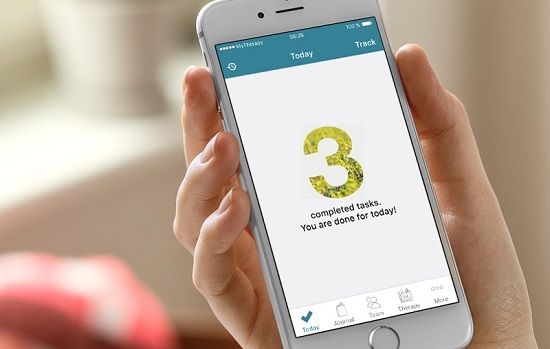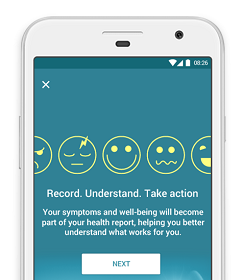When IBS Gets Irritating: Get Your Symptoms Under Control and Improve Your Well-Being with a Health Tracker App
When It Comes to Irritable Bowel Syndrome, You Need to Do Certain Things to Alleviate Your Symptoms. Let MyTherapy Help You Improve the Quality of Your Life. Find Out More Below ...

Irritable bowel syndrome (IBS) is the most common gastrointestinal disorder with worldwide prevalence rates ranging between 10% to 15%. It affects the large intestine and symptoms include cramping, abdominal pain, bloating, flatulence, and diarrhea and/or constipation. Only a small percentage of people with IBS experience severe symptoms. When diagnosing IBS, other conditions that present similar symptoms need to be excluded. Only then can a diagnosis of IBS be made. There are numerous treatment options available, including making diet and lifestyle changes, stress management, and medication and counselling (for more severe symptoms). Managing IBS needs close monitoring of symptoms and triggers and paying close attention to when symptoms improve or worsen. If you have IBS, health apps can help you develop a routine and make the necessary lifestyle changes.
With IBS, it is important that you track your symptoms and know what your triggers are. You will also need to make lifestyle and dietary changes and perhaps, at some stage, take medication. MyTherapy, which was designed to help people manage chronic conditions, comes with a comprehensive digital health diary that you can use to track your symptoms and set daily health and exercise goals. You can also record any important measurements and track your mood (to help with stress).
If you are taking medication for IBS, you can use the app’s medication reminders to help you take your medication as prescribed. You can also use the reminders for doctors’ appointments or counselling sessions (which help with stress management).
All the information that you record in the app is compiled into a monthly health report, which you can share with your doctor to help improve your IBS treatment and management and relieve symptoms.
The team at smartpatient, the company behind MyTherapy, also takes user feedback seriously, ensuring that we consistently improve the app to meet all your health needs.
Types of IBS and Common Symptoms
Most people with IBS experience their first symptoms between the ages of 20 and 30, with more women being affected than men. IBS is not life-threatening and it doesn’t increase your chances of developing other colon-related conditions, such as ulcerative colitis, Crohn’s disease, or colon cancer. However, IBS can be a long-lasting condition that changes your daily life.
The severity of symptoms varies from person to person and IBS can manifest in different ways. IBS is therefore divided into four types: IBS with diarrhea , IBS with constipation, IBS with both constipation and diarrhea, and IBS where people don’t fit into the other three categories. IBS with constipation is the most common type, affecting around 50% of people with IBS. IBS with diarrhea affects about one-third of people and about 20% of people with IBS experience alternating periods of diarrhea and constipation.
The most common symptoms of IBS are:
- Abdominal pain, which can be burning or cramp-like
- Diarrhea: soft or fluid stool, several times a day
- Obstructions
- Improvement of symptoms after bowel movements
- Rare or more frequent bowel movements
- Altered condition of the stool, for example slimy stool
- Bloating and flatulence
- Visible inflation
- Permanent fullness
- A belly that sticks out
Importantly, if you happen to notice blood in your stool, have fever, or lose weight; it is probably not irritable bowel syndrome. Even if the symptoms often occur at night and the course of the disease worsens, this is usually not due to IBS. In these cases, it is advised that you consult a doctor immediately, as serious conditions may often be hidden behind these symptoms.
A gastroenterologist can detect irritable bowel syndrome and exclude other conditions. Therefore, it is important that you seek medical advice. IBS, however, is not easily diagnosable and is determined by differential diagnosis. A specialist will ask questions about your history of illness and family life in conjunction with physical examinations. Ultrasound tests may also be conducted to determine various incompatibilities.
No Known Cause
While there are several things known to trigger the symptoms of IBS, it is not known what the actual cause of the condition is. Therefore, only assumptions can be made. Some of these assumptions include:
- Colon hypersensitivity, in which the colon reacts to mild stimulation
- The abnormal squeezing of the bowel muscles
- Chemicals made by the body, like serotonin and gastrin, that control nerve signals between the brain and digestive tract
- Gastrointestinal infections or a disturbed immune function
There are also certain risk factors that can increase your chance of developing IBS. These include age (IBS occurs more regularly in people under 50), sex (being female), having a family history of IBS, and having a mental health problem (anxiety, depression, and other mental health disorders are associated with IBS).
Triggers
The symptoms of IBS can be triggered by the following:
- Food: some people may experience a worsening of their IBS symptoms when they eat/drink certain things, including wheat, dairy, and carbonated drinks.
- Stress: most people with IBS experience more frequent symptoms in periods of high stress.
- Hormones: women may notice that signs and symptoms are worse during or around menstruation.
Combat IBS with These Treatments
The treatment of irritable bowel syndrome aims to alleviate and prevent symptoms. IBS with diarrhea can be treated with certain medications, like tannins, anti-diarrhea medications (loperamide, cromoglicic acid), or bicarbonate are used. Regarding loperamide, it is important to note that it must not be used for long-term therapy and should always be taken with your doctor’s consent. Furthermore, if you have IBS with diarrhea, you must take in an adequate amount of fluid and nutrients to make up for what is lost due to the diarrhea.
Liquid is also important in the case of blockages and is considered as part of treatment of IBS. In addition, laxatives, such as lactulose or bisacodyl, can be taken, which are usually administered in the form of suppositories.
Cramps and pain can be treated naturally with plant-based remedies. Medications, such as butylscopolamine, nifedipine, or mebeverine, are commonly used. Hot water bottles have also been known to provide temporary relief.
To get rid of flatulence, caraway, peppermint oil, or fennel can be very helpful. Drugs, such as simethicone or dimethicone, can also help alleviate these unpleasant symptoms.
It is important that you avoid stress and excitement when suffering from IBS. Relaxation methods, such as yoga, meditation, or autogenic training, may be helpful. A change of diet may also lead to an improvement in symptoms.
For IBS resulting from anxiety and other psychological illnesses, antidepressants or various forms of psychotherapy may be recommended.
If the medication prescribed by the physician is taken regularly and dietary and therapeutic plans are taken seriously, the symptoms of IBS can be significantly - if not completely - alleviated.
No More Irritation with MyTherapy
Lifestyle and dietary changes, stress management, and recognising other triggers are essential to alleviating the symptoms of IBS. Managing and staying on top of treatment is not always easy, so using a medication reminder and health tracker app, like MyTherapy, can be a valuable tool in the improvement of your quality of life and well-being. You can use MyTherapy to track your symptoms, triggers, mood, and daily habits and set daily health goals. If you are taking medication, you can use the app’s reminders for responsible medication intake and to remind you of upcoming appointments. To beat IBS, you need to adhere to your therapeutic plan strictly: MyTherapy can help you with is and offer you the support you need to stay on top of your treatment at all times. Furthermore, you can also share the monthly health report with your doctor so that he/she may get a good overview of your condition and see what else can be done to help you with symptom-control. With MyTherapy, you can get rid of those irritating IBS symptoms and live a full, active, and productive life.


